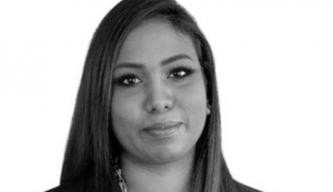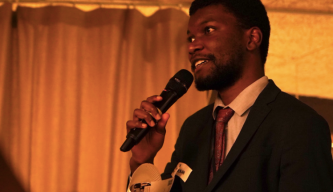

Sami Dar, Co-Founder of the 10,000 Able Interns Programme
Sometimes it’s the first thing a person will ask me, other times years will pass before the topic is broached. But when someone asks me about my disability, I tell them I have a brain injury. On paper, I have cerebral palsy, but it’s the same thing. I never really found that spearheading an explanation with medical jargon helped to deepen their understanding of my condition. Communicating it in a way they can comprehend and digest inherently helps with understanding. Like understanding that my disability is acquired, rather than a genetic condition. Or understanding why there is no defined list of symptoms; because any area of the brain can be affected. Considered communication is important. My hope is that, in sharing a little of my story, I can offer a perspective on why so much Disabled talent slips through the fingers of the British workforce. In doing so, perhaps I might deepen your understanding of why programmes like 10,000 Able Interns – and organisations like The 10,000 Interns Foundation – are paramount to the constructive evolution of our workforce.
I was born at 28 weeks gestation, which is probably the only thing I’ve ever been early for. This wasn’t an inherent issue in itself, but when my head hit the pelvic bone during the delivery, my still-soft skull was easily and significantly bruised. I had a life expectancy of 72 hours, so I have lots of pictures from the first few days – an attempt to anchor my three days to something more tangible than a memory. As I passed the 120 hour milestone, whilst the dark patches around my protective helmet still told a tale of heavy bruising, my condition was stabilising. I continued to recover for another month before being sent home.
At the time, it was just considered an early scare. The brain develops so much in the first few years of a child’s life that irregularities are almost impossible to detect. Any neurological scans would’ve ultimately been futile. So for the first few years, I just did whatever it is that babies do with their time, free of any medical treatments or labels. But during those first few years, I started to fall short of developmental milestones, like sitting up, and walking. Medical assessments soon followed, as did my subsequent diagnosis, aged two.
As the time came for me to be enrolled into education, I was referred to a mainstream primary school that had a robust support system in place for Disabled children. I had access to things like in-house physiotherapy facilities, and extensively-trained staff. However, it also meant that I was placed in the special needs classroom, by default. Special needs units often cater to children with learning disabilities and intellectual disabilities, and many Disabled children start off there, until they show evidence of being able to manage mainstream education. I didn’t actually realise how common of an experience this was until some students applying to 10,000 Able Interns mentioned their own experiences. I understand the logic in educating all the Disabled children collectively; our needs extended beyond academia alone. But in hindsight, a more nuanced solution was needed. I was 6 or 7, being tested on the most basic concepts in school, and reading Harry Potter and the Goblet of Fire at home. After a few years of being allowed to join the mainstream class a couple of afternoons per week, I was eventually afforded the chance to join permanently. It’s hard to say how much this stifled my academic development, to be honest. I’m pretty happy with my education, all things considered.
I was in mainstream education for a year or two before I had to be pulled out of school to undergo surgery, aged 10. I was the subject of a medical study that sought to assess the proficiency of a new form of surgery against existing methods. It was an intense procedure involving the lengthening of my tendons and the realignment of my bones, each of which were broken and reinforced with titanium. There were a few other procedures involved, but they were secondary by comparison. The surgery itself took 8 hours, with rehabilitation taking 2 years. I was enrolled into the hospital’s school, which was more a place for keeping patients occupied than academic development. I definitely took it too seriously though – I remember it being my first experience with algebra, something I couldn’t wrap my head around at the time but I was eager to get back to learning.
By the time I finally went back to school, it was time for me to start secondary school. To go from being 10 years old to returning to a school full of teenagers was a big jump. I got into a local grammar school, and on top of the intense academic expectations that accompanied the opportunity, I was their first Disabled student. They tried their best, but their lack of experience was telling, and my experience was disjointed at times. I could say the same about my entire education, it was definitely a disjointed one, but I did well enough, and I went onto study BSc Management at Warwick Business School.
I think my university experience suited me much better. There was an inherently flexible approach to learning which made it much easier to reshape my routine to suit my needs. I also had the autonomy I needed to grow as a person, away from the sometimes intense institutional safeguarding I’d experienced as a child. I learnt to drive, cook (sort of, don’t quote me on that), and just generally shoulder responsibility for the maintenance of my own life. This was great, but also another adjustment that I had to balance alongside academia.
When it came to starting to pursue a career path, I didn’t really know where to start. I also come from a low-income background, and I was the first in my family to go to university, so it was all very new to me. When the first internship application cycle came about in September of my second year, I had no idea internships were something that I should be competitively pursuing until I found myself surrounded by students with cover letters, Excel trackers and situational judgement tests. It was very much a case of flying the plane as I was building it. I didn’t know what I wanted to do, but I was already so behind on applications, so I just started applying to any opportunity I could.
Applying with clarity and intention is important when putting forward a strong application, but it also takes time. I’ve already mentioned the balancing act that came with academic expectations and living an independent life as a Disabled person. It would take 30-45 minutes to get to a lecture. If I had back-to-back lectures in different locations, I just had to pick one. Grocery shopping took me a few hours. Laundry took me a few hours. Cleaning up after cooking took almost as long as cooking, so I didn’t cook much. The introduction of internships only added to the juggling act, and as important as it is to tailor your applications to each employer, quantity is also important, and it was never something I could sustain. There was definitely a gap in the market for a framework that would better cater to the needs of Disabled students looking to land their first experience in the workplace.
I found myself graduating with a solid degree, but little experience, which in turn offered me almost no insight into what I wanted to do next. I enjoyed the intersectionality between business and finance, and the way one underpinned the other, but I knew how hard it was to break into a ‘high finance’ role without relevant experience. So I took a scattered approach of applying to roles within finance more broadly to get some exposure to the corporate world. Upon receiving an offer in financial audit, I also set out to fill the gap in the market that I have experienced. With the help and support of the co-founders of the 10,000 Interns Foundation, we started to build the 10,000 Able Interns programme.
My own lived experience was reinforced by industry data, with employment rates for the Disabled population being 30% lower than the rest of the British workforce. This tends to be one of the go-to statistics when looking to highlight the problems facing the Disabled population in the UK. It’s a figure that can quickly offer a digestible overview of the disability employment gap, but there are so many statistics that offer a more nuanced insight. 1 in 4 entrepreneurs in the UK are Disabled, which I think speaks to the failure of the British workforce to cultivate a truly inclusive environment. For a multitude of reasons, employers in the corporate sector often have a uniform way of getting things done, which leaves little room for people with differing needs to flourish. The disproportionately high number of entrepreneurs that have a disability tells a story of a marginalised group of talent forced to forge their own environment of inclusivity because they couldn’t find one through traditional means of employment.
What I hoped to convey in writing this piece is that the disability employment gap goes far beyond access requirements. For large parts of my primary school experience, I didn’t receive a full education. I then took this staccato education into a grammar school which had no experience with a Disabled student. I moved onto a competitive university, which I then had to juggle with shouldering the weight of being Disabled and living independently. I pushed myself to compete for the most sought after roles in finance, and I was often up against privately-educated talent, who had every available opportunity afforded to them. When you consider the compounding effects of each stage of my education, it can be tough to maintain pace with such accomplished competition, and It goes far beyond my experiences. For instance, can a neurodiverse student that struggles with communication network in the same way as their competition, and how much does that impact their prospects? There’s no place to contextualise your achievements on a CV, and if there were, I’m not sure I could articulate something so nuanced in less than a page. So instead, many Disabled students have no choice but to shoulder an invisible weight of disadvantage in each interview, and hope they’re still able to perform to the highest standard.
If we’re to embark upon a paradigm shift, and truly embrace disability in the workplace, we must do so collectively. Since its pilot in 2022, 10,000 Able Interns has created 150+ internships with disabilities and long-term health conditions in the UK and this year we will create a further 250+ opportunities. I’m incredibly proud of what the 10,000 Interns Foundation team and I have accomplished in the year following the programme’s inception, but there are many more Disabled students in search of opportunity. It will take the collective effort of entire industries to elicit tangible, sustained change. I hope that, in time, we can persuade every firm to join us on our journey to a more equitable tomorrow.


